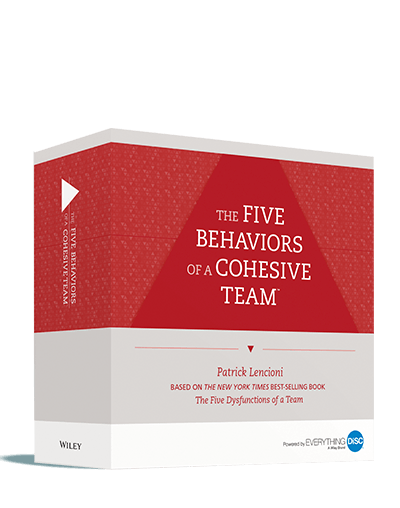The Five Behaviors Team Development Facilitation Kit
The Five Behaviors of a Cohesive Team facilitation kit is the companion to the corresponding assessment and profile report.
Using them together helps you strengthening a teams’ cohesion, using a first class assessment and facilitated development program to understand, embrace, and put into practice proven behaviors for better trust, more healthy debate, increased commitment, accountability and results.
The facilitation kit, used by HR facilitators, consultants & coaches brings facilitated learning experience that helps professionals and organisations discover what it takes to build a truly cohesive & effective team.
Five Behaviors of a Cohesive Team Facilitation Kit:
Facilitate training sessions using Five Behaviors of a Cohesive Team profiles.
Why should you consider buying a Five Behaviors of a Cohesive Team facilitation kit? The Five Behaviors of a Cohesive Team Facilitation kit, available in several languages, offers facilitation content you need, in order to confidently lead a facilitated session with participants, who have passed a Five Behaviors of a Cohesive Team Assessment and wish to build on the profile to learn how to become a tighter team.
Five Behaviors of a Cohesive Team helps teams understand how to apply The Five Behaviors™ model of Trust, Conflict, Commitment, Accountability, and Results to their work culture.
Who is the program designed for?
The Five Behaviors of a Cohesive Team assessment is designed for an intact team. Before choosing this program, consider if your team really is a TEAM? A team is a relatively small number of people (from three to twelve) who meet on a regular basis and are collectively responsible for results.
How this programme can work for you
A group that appears to be a team might simply be a collection of people who report to the same manager, but who have relatively little interdependence and mutual accountability. If a group does not meet the criteria of a true team, this process is unlikely to produce the results they expect. We can help you find out if this program is right for your team.
- The Five Behaviors of a Cohesive Team profile report provides individual and team feedback on how they score on the key components of the model: trust, conflict, commitment, accountability, and results.
- The facilitation based team learning programme is powered by Everything DiSC® and All Types, it offers a model that helps individuals to understand themselves and others better, within the team setting.
- A follow-up report helps measure and track progress of the team.
This comprehensive Team Programme includes:
Profile report
Two Five Behaviors of a Cohesive Team Assessment and Profiles Reports are used with the Five Behaviors of a Cohesive Team facilitation kit: one is powered by Everything DiSC and the other by All Types (Jungian Types - mbti compatible). Choosing amongst the two depends on what you're used to. Both have:
- 36-page highly personalised assessment results for individual and team
- Strong visuals illustrate key messages
- Context-specific feedback
- Tips and strategies for improving teamwork effectiveness
- Opportunity for building an action plan
View Samples (please ask us, by using the contact form):
- The Five Behaviors of a Cohesive Team Sample Profile powered by Everything DiSC
- The Five Behaviors of a Cohesive Team Sample Profile Powered by All Types
Find more resources and info, please click on the "Everything DiSC" and "All Types" tabs.
The Team Programme includes seven modules from 1 to 3 ½ hours in length.
Your program runs from anything like one day up to 4 days of facilitated learning. This is not a standard training programme, rather a facilitated learning process: your facilitators need the appropriate skills and experience to run the programme with success. Read more in the 5 steps section and discover what makes this programme so compelling.
Each module includes:
- Facilitator's Guide in MS Word
- Participant handouts in MS Word
- PowerPoint with embedded video
Module 1:
Introduction: Introduces The Five Behaviors of a Cohesive Team Model
Module 2:
Building Trust: Teaches the concept of vulnerability-based trust
Module 3:
Mastering Conflict: Helps participants understand the benefits of healthy conflict
Module 4:
Achieving Commitment: Shows how clarity and buy-in are key to achieving commitment
Module 5:
Embracing Accountability: Stresses the importance of peer-to-peer accountability
Module 6:
Focusing on Results: Emphasizes that collective results are more important than individual goals
Module 7:
Review and Action Plan: Review what was learned and create an action plan to improve the team’s productivity[/vc_message][vc_column_text]
Please note: team member profiles are purchased separately.
Additional information
| Category | Facilitation Kits |
|---|---|
| Product Family | Five Behaviors of a Cohesive Team |
| My objective | Make my team cohesive |
| My job / role | DiSC Facilitator, Experienced Facilitator, HR Professional or Manager, Senior Manager / Leader, Team Manager |
Advantages of Everything DISC
Improve self-awareness.
Constructive change begins with self-knowledge. With a DiSC profile you know better how you react to disagreements, what motivates or stresses you, and how you solve challenges.
Improve team spirit.
In the modern working world, it is within teams that things get done. With a DiSC profile you learn how to better communicate and understand each other in a team
Positivize disputes.
With DiSC profiles, the dispute can be transformed into a positive and productive exercise that helps business move forward with momentum.
Develop stronger sales skills.
With a DiSC profile you improve your sales effectiveness. Understanding and adapting to your customers’ styles is essential to making connections work on a human level.
Manage more effectively.
A leader naturally becomes more effective when he or she understands the preferred work styles and dispositions of team members.
Facilitate, train or accompany without judging.
No one likes to be judged. DiSC profiles level the playing field by giving stakeholders and participants the non-judgmental information they need to learn more effectively.
the customers we work with…


